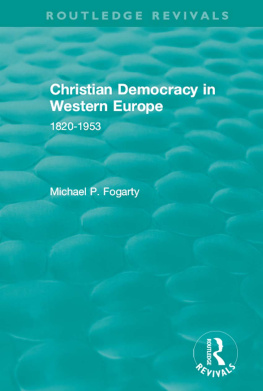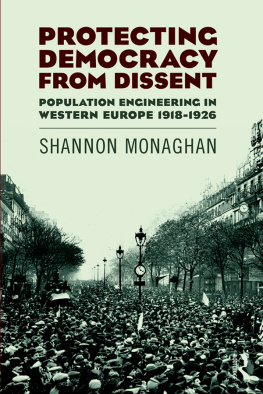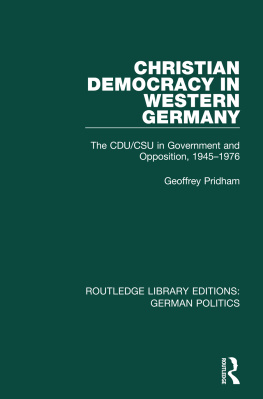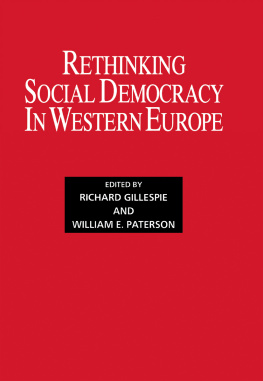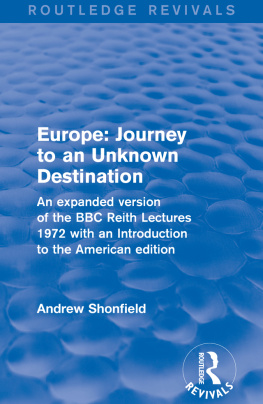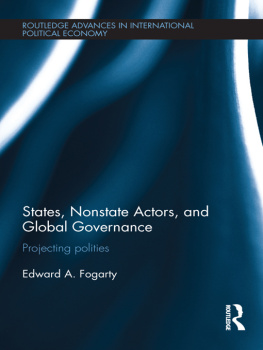Routledge Revivals
Christian Democracy in Western Europe: 1820-1953
First published in 1957, this book is a detailed analysis on Christian Democracy, a movement backed by Protestants as well as Catholics, which has become one of the great social forces of Western Europe. It is strong in eight countries. The first half of Fogartys book sets out what the many Christian-Democratic movements stand for. The second part of the book shows how these movements began, how they have grown, changed, and consolidated, and how they developed into the mid-20th century. This is a broad and useful survey which delves the history, nature and significance of the Christian Democratic movements in Europe. In Fogartys analysis, Christian Democracy may indeed bring about a renewed unity of the Christian tradition in Western society.
Christian Democracy in Western Europe
1820-1953
Michael Patrick Fogarty
First published in 1957
by Routledge
This edition first published in 2018 by Routledge
2 Park Square, Milton Park, Abingdon, Oxon, OX14 4RN
and by Routledge
711 Third Avenue, New York, NY 10017
Routledge is an imprint of the Taylor & Francis Group, an informa business
1957 Michael Patrick Fogarty
All rights reserved. No part of this book may be reprinted or reproduced or utilised in any form or by any electronic, mechanical, or other means, now known or hereafter invented, including photocopying and recording, or in any information storage or retrieval system, without permission in writing from the publishers.
Publishers Note
The publisher has gone to great lengths to ensure the quality of this reprint but points out that some imperfections in the original copies may be apparent.
Disclaimer
The publisher has made every effort to trace copyright holders and welcomes correspondence from those they have been unable to contact.
A Library of Congress record exists under ISBN: 57003082
ISBN 13: 978-1-138-50061-7 (hbk)
ISBN 13: 978-1-315-14409-2 (ebk)
CHRISTIAN DEMOCRACY IN WESTERN EUROPE
1820-1953
by
MICHAEL P. FOGARTY
Library of Congress Cataloging in Publication Data
Fogarty, Michael Patrick.
Christian democracy in Western Europe, 1820-1953.
Reprint of the 1957 ed. published by Routledge & K. Paul, London.
Bibliography: p.
1. Christian democracy. 2. Europe--Social conditions . I. Title.
[HN373.F6 1974]261.873-11997
ISBN 0-8371-7114-8
by Routledge and Kegan Paul Ltd.
First published in 1957 by Routledge & Kegan Paul Ltd., London
Library of Congress Catalogue Card Number 73-11997
ISBN 0-8371-7114-8
CONTENTS
GENERAL INDEX |
INDEX OF NATIONAL ORGANISATIONS |
PUBLISHERS NOTE
The listings in the table of contents for General Index, page 453, and Index of National Organisations, page 458, are incorrect. These two indexes never existed, and it was the intention of the original publisher to delete them from the contents. To preserve bibliographic integrity, Greenwood Press has not corrected the table of contents. This 1944 reprint edition is a facsimile of the original edition published in 1957.
LIST OF TABLES
TABLE
T HIS book is a preliminary survey of one aspect of the social influence of the Christian Churches. It is not about their social message, in the sense of the principles of social action proclaimed by each Church as such and by its clergy on its behalf. Nor is it about the religious aims of Church organisations, like those of Catholic Action, which, though concerned with practical economic and social activities, are formally or in fact auxiliaries of the clergy. Its Subject is Christian Democracy, the area in which lay men and women, inspired by their Christian faith, take independent responsibility for the running of political parties, trade unions, farmers unions, and the like. Christian Action organisations, the direct auxiliaries of the clergy, are considered in so far as they too have activities parallel or allied to those of Christian Democracy.
The business reason (so to speak) for studying Christian Democracy is in my case that, as an economist responsible for the last four years for a Department of Industrial Relations, I wanted to find out more about some of the Christian Democratic economic and social organisations, especially the trade unions and employers associations. These organisations have been particularly interested in workers control in industry, and especially in the part to be played in it by the rank and file as apart from full-time union officials. They have tried to work out a balance between the centralisation and decentralisation of economic control, and this has led them among other things to pay special attention to the role of the organised industry. It seemed that these and other aspects of the Christian Democrats industrial policy should contain lessons of general importance, and therefore I set out to write a specialised study covering that field.
For several reasons this original limited project expanded into a plan for a general survey. One, I must admit, was personal interest. I have been active for a good many years in various Catholic and inter-denominational groups, which have brought me a wide range of international contacts. I am a member of the International Union of Social Studies (Union of Malines), and have lectured at the Semaine Sociale de France and opened a discussion group at the Deutscher Katholikentag. I have found myself in various more or less official capacities at meetings of all kinds and degrees of publicity, from the Annual Congresses of the N.E.I.the Christian Democratic parties Internationalby way of the International of Catholic employers and workers, to a series of Protestant-Catholic conversations on the common ground between the Churches in economic and social affairs. As a member of the Labour Party I found myself present at the Socialist Internationals Bentveld Conference in 1953 on Religion and Socialism, and so in direct contact with the religious socialist movement. The extent and unity of Christian Democracy gradually came home to me; a unity extending even beyond the limits of what are conventionally known on the Continent as the Christian Democratic movements. If I was to spend time and raise money for a study in this field at all, it seemed tempting to use the opportunity to bring all this experience into focus.
I dare say I could have resisted this temptation and stuck to my professional last if it had not been for certain other very practical reasons for making a general survey first. The Christian Democratic movements hang together in the sense not only of mutual aid but of mutual inspiration. If one examines their programmes and finds out what they are trying to do, it turns out that the very essence of it is catholicity. They are trying to create a broad synthesis incorporating and bringing into perspective elements which tend, Christian Democrats would say, to be one-sidedly emphasised in the traditions of conservatism or liberalism or socialism; together with certain other federalist or pluralist ideas which are the characteristic contribution of the Christian social movement itself. It is this catholic, synthetic view which makes the Christian Democratic parties for instancetend to appear at or about the centre of the political stage. And the synthesis which Christian Democrats aim at creating is not arrived at only by abstract thought, or by any one movement on its own. A main factor in it is the interplay, with reference to concrete problems, of organisations and interest groups each of which influences the rest. To understand one movement it is necessary to cast at least a glance at all. This would not be difficult if Christian Democracy had been studied as thoroughly as, for instance, Socialism. But it quickly became apparent, so far as my own original project was concerned, that I was unlikely to find in any language the background material needed to put the trade unions and employers organisations in their right perspective unless I dug so far into other subjects and examined so much first-hand material as to provide myself with the material for a general survey.



